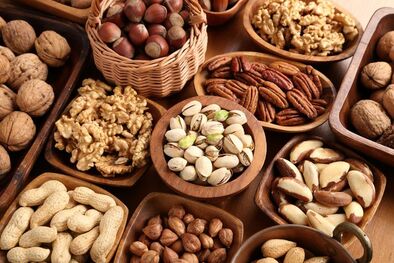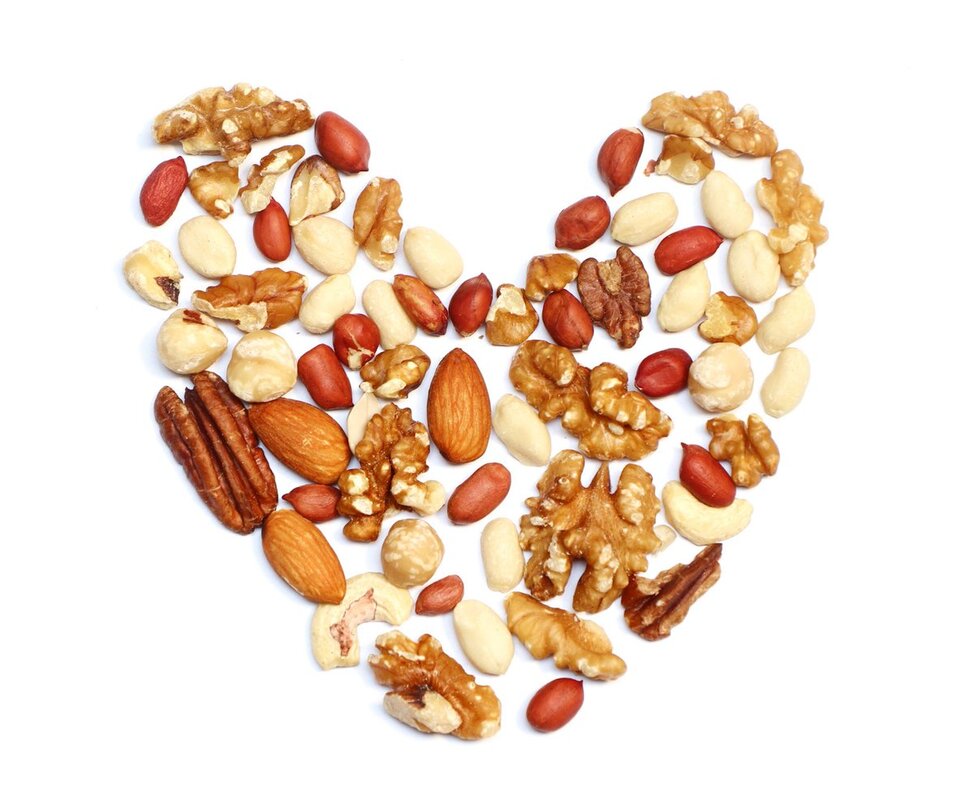 Choose your Favorite Tree Nut to Snack Upon Choose your Favorite Tree Nut to Snack Upon If you consider nuts as yet another calorie-rich junk food then there is no harm in saying that you have gone nuts over your dietary intake! If you ponder, nuts are an excellent source of proteins, healthy fats, dietary fiber, minerals and vitamins that add good health and nutrient benefits. In-depth analysis of various cohort studies shows us that frequent nut consumption is associated with a reduced risk of developing hypertension, cardiovascular disease (CVD), cancer and all-cause mortality. It’s no news that CVD exists as one of the topmost causes of death globally and our current lifestyle remains as the number one reason. Individuals affected by CAD receive medications to protect them against recurring cardiac events alongside lifestyle changes too that include regular physical activity, a low-fat plant-rich diet and quitting smoking. But rather than making such lifestyle changes after being affected by heart-relate health issues isn’t it clever to prevent them in the first place with proper dietary routines and physical activities? Men have been in love with meat as theoretically they assume that meat defines masculinity and this might also be the reason that we don’t find many of them sitting down with a bowl of green salad for their meal too. But in recent years, we have seen a shift in dietary recommendation from plant-based foods to animal-based foods as this helps in the prevention of chronic diseases. These plant-based diets have nuts as one their key components which is also a food that has been used for human consumption since ages. Humans have discovered innumerable nut varieties including Brazil nuts, almonds, pistachios, pine nuts, pecans, walnuts and macadamias with each variety having unique nutrients bestowed upon it. In general, these nuts provide energy, heart-healthy oils, vegetable protein, phenols, phytosterols, flavonoids, resveratrol and bioactive compounds which in combination with vitamin E and selenium serve as antioxidants that have the potential to reduce the risk of cardiovascular disease and cardiovascular risk factor (CVRF). We have studies showing that tree nut consumption has an inverse association with all-cause mortality and death due to heart disease. Other studies show that nut consumption is linked to healthier levels of CVRF including total cholesterol, low-density lipoprotein cholesterol (LDL-C), high-density lipoprotein cholesterol (HDL-C) and triglycerides. Read further to understand the impact of tree nuts on heart health. NHS Prospective Cohort Study This is a large study starting from 1976 that included 76,364 female nurses aged between 30 and 55 years from 11 different U.S. states. The NHS II commenced in 1989 consisting of 92,946 young female registered nurses aged between 25 and 42 years at baseline. Another cohort study, the HPFS that started in 1986 included 41,526 male health professionals aged between 40 and 75 years. Information regarding medical history, lifestyle and health conditions was collected using questionnaires every 2 years since baseline in all three studies. The primary outcome measure in these studies included major CVD defined as a combined endpoint of myocardial infarction, stroke and fatal CVD. Secondary outcome measures were total CHD (defined as fatal or non-fatal myocardial infarction) and total stroke (includes all fatal and non-fatal stroke cases). Dietary intake was assessed using a semi-quantitative food-frequency questionnaire (FFQ) with over 130 items administered every 2-4 years. During the years 1980 and 1984, the FFQ included a question on how frequently the participants consumed a serving of nuts during the previous year and the options included never or almost never, 1-3 times a month, once a week, 2-4 times a week, 5-6 times a week, once a day, 2-3 times a day, 4-6 times a day and more than six times a day. In the subsequent FFQ, the question on nuts was split into two items-peanuts and other nuts. Walnuts also became a part of the FFQ first in 1998 in the NHS and HPFS and in 1999 in the NHS II. Total nut consumption was considered as the intake of peanuts, other nuts and walnuts. The NHS, NHS II and the HPSF study had a follow-up period of 28.7, 21.5 and 22.5 years respectively during which a total of 14,136 cases of CVD including 8,390 CHD and 5,910 stroke cases were included. In comparison to those who never consumed nuts those who did consume more frequently were older, had a lower BMI, were less likely to smoke, likelier to exercise and consume more fruits and vegetables. Results showed that:
Nut Consumption Decreases CVD Risk in Patients with Type II Diabetes We do have studies quoting the benefits of tree nut consumption on heart health but there aren’t many linking its effect on individuals with type 2 diabetes. Individuals with diabetes mellitus at baseline (here participants from the same NHS and HPSF were included) and incident diabetes mellitus at follow-up through 2014 were included excluding those who has CVD or cancer at baseline, reported CVD or cancer before diabetes mellitus diagnosis during follow-up or had missing info on nut consumption at baseline. Hence, only 12,006 women with diabetes mellitus in the NHS and 4211 men with diabetes mellitus in the HPFS group were included. Dietary intake was analyzed using an FFQ with 131 food items administered every 2-4 years. Question on nut servings was the same as given in the study above. In the subsequent FFQs questions on nuts was split into 2 categories-peanuts and tree nuts such as walnuts, almonds, Brazil nuts, cashews, pistachios, pecans, macadamias, hazelnuts and pine nuts. Results showed that a total of 3336 CHD cases (including 2567 CHD cases and 789 stroke cases) and 5682 CVD (including 1663 CVD death and 1297 cancer deaths) were identified. Every serving/week increase in nut consumption was associated with a 3% lower risk of CVD incidence and 6% lower CVD mortality. 1 serving/week increase in tree nut consumption was associated with a 5% lower risk of CVD incidence and 11% lower risk of mortality. In comparison to participants without changes in nut consumption those who increased their nut consumption after diabetes mellitus had a 11% lower risk of CVD, 15% lower risk of CHD, a 25% lower CVD mortality and a 27% lower all-cause mortality. The study clearly shows that frequent consumption of nuts, especially tree nuts was associated with a lower risk of CVD incidence and mortality among participants with diabetes mellitus. Tree Nut Consumption & CVRF We don’t have much studies looking at tree nut consumption and CVRF and the study elaborated here focuses on this aspect using data from participants of the National Health and Nutrition Examination Survey (NHANES) 2005-2010. Dietary intake was evaluated using two multiple pass 24-h dietary recall. Height, weight, BMI, waist circumference, SBP, DBP, triglycerides, fasting glucose levels and insulin were determined on subjects. 14,386 subjects participated of which only 755 (6.8%) of them consumed tree nuts. Results showed that tree nut consumers had:
Nuts have a positive effect on heart health in different ways. The unsaturated fat content helps lower LDL (bad) cholesterol levels while increasing HDL (good) cholesterol levels. A group of unsaturated fats found in walnuts, the omega-3 fatty acids also prevents the development of erratic heart rhythm. Omega-3 fatty acids also prevent blood clot. Hence, it is ideal that you include nuts as a part of your daily dietary routine. But simply snacking on them without minding portions can only lead to weight gain down the lane. This weight gain becomes as a risk factor for heart disease rather than offering protective benefits for heart health. European Society of Cardiology (ESC) guidelines lists 30 grams of unsalted nuts per day to be included as a part of a daily diet plan in salads, as a snack or in smoothies to stay healthy. Sticking to guidelines and leading an active life can surely protect us from heart diseases. References Nut Consumption & Risk of Cardiovascular Disease: https://www.ncbi.nlm.nih.gov/pmc/articles/PMC5762129/ Nut Consumption in Relation to Cardiovascular Disease Incidence & Mortality Among Patients with Diabetes Mellitus: https://www.ahajournals.org/doi/10.1161/CIRCRESAHA.118.314316 Tree Nut Consumption is Associated with Better Adiposity Measures and Cardiovascular & Metabolic Syndrome Health Risk Factors: https://nutritionj.biomedcentral.com/articles/10.1186/s12937-015-0052-x Intake of Partially Defatted Brazil Nut flour Reduces Serum Cholesterol in Hypercholesterolemia Patients: https://nutritionj.biomedcentral.com/articles/10.1186/s12937-015-0036-x Eating Nuts Linked with Lower Risk of Fatal Heart Attack and Stroke: https://nutritionj.biomedcentral.com/articles/10.1186/s12937-015-0036-x Comments are closed.
|
AVOID FRAUD. EAT SMART+91 7846 800 800
|
- Home
- Written Testimonials
- Consult
- Clinics
- Blogs
-
Diet & Nutrition
- Diabetes Reversal
- IVF IUI not needed for PCOS PCOD Infertility
-
Medical Nutrition
>
-
Disease & Conditions
>
- Infertility | PCOS
- Diabetes Mellitus
- Cholesterol
- Hypothyroid
- Kidney Problems
- Hypertension
- Cardiovascular Diseases
- Liver Diseases
- Gastro intestinal disorder
- Cancer
- Metabolic Disorders
- Orthopedic Disorders
- Eating Disorders
- Dietary Recall
- Weight Record Filled By Clients
- Online Payment Transaction Details
- Online Clients Weight Check Form
- Our Program Package Service Charges
- Weight Record 2017 Clients
- Measurements sent by Clients
- Terms & Conditions Of Payment
- Thanks. Your Form is Submitted
- Video Testimonials
- Lifestyle & Wellness
- Lifestyle & Wellness Blog
- Allergy & Intolerance
- Weight Loss / Gain
- Weight Loss / Slimming Blog
-
Disease & Conditions
>
- Life Cycle Nutrition >
- Sports Nutrition >
- Integrity in Nutrition
- Knowledge Centre
© COPYRIGHT 2022. ALL RIGHTS RESERVED. FRST HEALTHCARE PVT LTD.
Dr. Nafeesa Imteyaz of First Eat Right clinic, is the Best Dietitian Nutritionist in Bangalore. Best Dietitian Nutritionist in Pune. Best Dietitian Nutritionist in Hyderabad. Best Dietitian Nutritionist in Chennai. Best Dietitian Nutritionist in Mumbai. Best Dietitian Nutritionist in Delhi. Best Dietitian Nutritionist in Kolkata.



